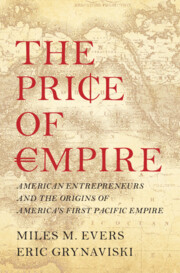
- Publisher:
- Cambridge University Press
- Online publication date:
- March 2024
- Print publication year:
- 2024
- Online ISBN:
- 9781009396356

The United States was an upside-down British Empire. It had an agrarian economy, few large investors, and no territorial holdings outside of North America. However, decades before the Spanish-American War, the United States quietly began to establish an empire across thousands of miles of Pacific Ocean. While conventional wisdom suggests that large interests – the military and major business interests – drove American imperialism, The Price of Empire argues that early American imperialism was driven by small entrepreneurs. When commodity prices boomed, these small entrepreneurs took risks, racing ahead of the American state. Yet when profits were threatened, they clamoured for the US government to follow them into the Pacific. Through novel, intriguing stories of American small businessmen, this book shows how American entrepreneurs manipulated the United States into pursuing imperial projects in the Pacific. It explores their travels abroad and highlights the consequences of contemporary struggles for justice in the Pacific.
‘Many scholars assume that the United States expanded across the Pacific during the 1800s in pursuit of strategic territories or access to Asian markets. The Price of Empire persuasively dispels these state-centric myths, demonstrating through clear theoretical argumentation and careful historical analysis how private entrepreneurs drove U.S. expansion in the Pacific by coopting state agents and lobbying federal leaders. It is an essential read for political scientists and historians interested in American imperialism.’
Richard W. Maass - Associate Professor of Political Science, Old Dominion University
‘Rich with historical detail and theoretical insight, Evers and Grynaviski provide a bold reassessment of the origins of the American empire in the Pacific. Their focus on the role of individual entrepreneurs, and the boom-and-bust commodity cycles that shaped their political lobbying, represents an important innovation in economic theories of overseas expansion. An essential read for both international relations scholars and historians of American foreign relations.’
Paul K. MacDonald - Professor of Political Science, Wellesley College
‘Highly recommended.’
R. M. Whaples Source: CHOICE
‘… well researched, clearly articulated and convincing in its analysis.’
Jeremy Kuzmarov Source: International Affairs
 Loading metrics...
Loading metrics...
* Views captured on Cambridge Core between #date#. This data will be updated every 24 hours.
Usage data cannot currently be displayed.